Share
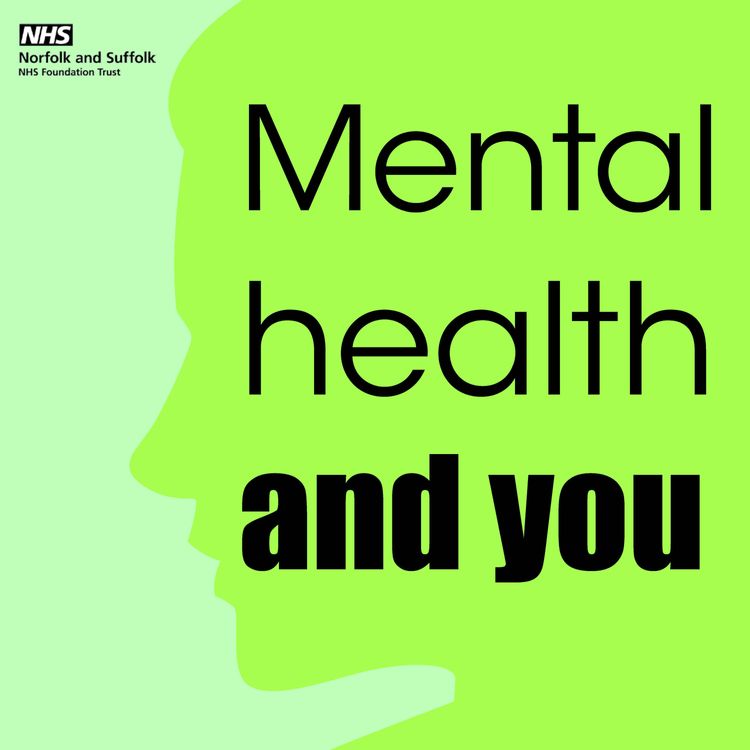
Mental Health and You
Research: 'Aspirational' new family project
This week we hear from research about a very important and exciting new project from NSFT Research which aims to develop an intervention to build resilience in young people who have experienced Adverse Childhood Experiences called ASPIRE. Lead researcher on the ASPIRE Project, Brioney Gee and Research Assistant Psychologist on ASPIRE Isabela Tavares Junqueira, explain a few months into the project what is involved, the huge role co-production has and how the project is going. ASPIRE is funded by the National Institute for Health Research (NIHR).
This study is about co-producing, together with people who have relevant personal experience, a new support package for families. The new support package will aim to empower a child’s caregiver – be it their Mum, Dad or someone else who is looking after them – to use evidence-based techniques to build their child’s resilience, rather than a professional working with the young person directly.
We hear from two members of the stakeholder team who have relevant lived experience, Rachel a parent of three and Seb who is a young person giving input on various parts of the project.
The intervention will be designed to support children who have experienced Adverse Childhood Experiences (ACEs) which are traumatic or stressful events that occur before the age of 18. These include experiences such as abuse, neglect, family break-up, being bullied, or experiencing a serious illness.
These ACEs have been linked to increased risk of a wide range of negative health outcomes across a person’s life. We now know there is a strong link between the number of ACEs a person is exposed to and their odds of experiencing mental health problems.
However, not all children who experience ACEs develop mental health difficulties. Some young people have social support and personal strengths that allow them to remain healthy despite difficult experiences, something known as ‘resilience’. The amount of resilience someone has is not fixed, so if we can increase a young person’s resilience, we can decrease the risk of poor mental health.
Transcript of Seb’s contribution to the podcast:
14.50 I am a fan of co-production and I think it is a great idea to do co-production. What is the point of doing it with the old system if we can’t put co-production in to because it is too big and it’s too and it’s too far down the plan.
17.00 Young people need to know what is going on, young people need to understand what you are talking about and young people need to feel that we are, they have been seen and heard and feel that something is changing, something that they heard or seen or said that something will change.
The co-lead for this project is Prof. Cathy Creswell who is based at the University of Oxford, and other partners on the project include Dr Clio Berry who is based at Brighton and Sussex medical School, Dr Tim Lomas based in the USA, Dr Jon Wilson and Dr Tim Clarke from NSFT, and Tina Walker who is a parent/carer with experience based expertise.
If you want to get involved with ASPIRE then please email Aspire@nsft.nhs.uk
Music
Titles: Light Thought var 1 Kevin MacLeod (incompetech.com) Licensed under Creative Commons: By Attribution 3.0 License
Title: Soft Glitch Logo License: Business License, Commercial, ASCAP
Publisher: OV Soundtracks Composer: Oscar A. Veliz PRO: ASCAP
The National Institute for Health Research (NIHR) is the nation's largest funder of health and care research. The NIHR:
- Funds, supports and delivers high quality research that benefits the NHS, public health and social care
- Engages and involves patients, carers and the public in order to improve the reach, quality and impact of research
- Attracts, trains and supports the best researchers to tackle the complex health and care challenges of the future
- Invests in world-class infrastructure and a skilled delivery workforce to translate discoveries into improved treatments and services
- Partners with other public funders, charities and industry to maximise the value of research to patients and the economy.
The NIHR was established in 2006 to improve the health and wealth of the nation through research, and is funded by the Department of Health and Social Care. In addition to its national role, it supports applied health research for the direct and primary benefit of people in low- and middle-income countries, using UK aid from the UK government.
Please do keep in touch with us, let us know what you would like to hear featured because this podcast is about mental health and you.
Twitter @NSFTtweets
Facebook: https://www.facebook.com/NSFTrust/
Email: NSFT.communications@nsft.nhs.uk
and put podcast in the subject line.
More episodes
View all episodes
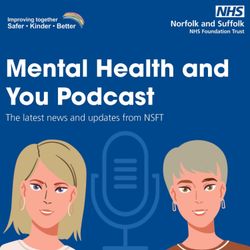
1. Tackling isolation and loneliness for older people
38:19||Season 6, Ep. 1In this episode, Nina and Gay chat to the team at Carlton Court Hospital, near Lowestoft, which is helping to tackle isolation and loneliness for older people, those with dementia, and their carers, including two support groups.They also find out more about NSFT’s In-reach/Outreach work on the wards and with care homes in the community and what kind of support there is for older people and those with dementia from NSFT’s Recovery College.Guests are Sarah Nicholls, Safer care practitioner and QI improvement lead, Sean Day, Older People’s Inreach/Outreach, and Sarah Kennard from the Recovery College.Read the story: https://www.nsft.nhs.uk/news/teams-promote-community-support-for-older-people-and-carers-4885Learn more about the Recovery College: Recovery College | Norfolk and Suffolk NHS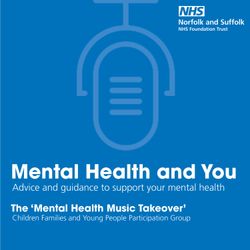
21. The Mental Health Music Takeover
21:21||Season 5, Ep. 21Trigger Warning - This podcast contains discussion around the subject of suicideThis week we're joined by members of the Children Families and Young People Participation Group who share their own experiences and how music has supported them through difficult times.Read more about the Mental Health Music Takeover here: Young people tune in to boost their mental health.Listen to the Mental Health Music Playlist: Mental Health Music Takeover Playlist - YouTube.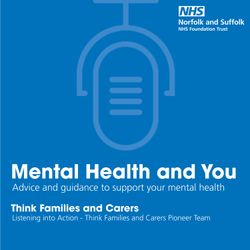
20. Think Families and Carers
36:56||Season 5, Ep. 20This week the Mental Health and You Podcast is joined by Kelly, Julie and Trevor who talk about the Think Families and Carers Listening into Action group at NSFT. They share how they got involved, what the groups achieved and what the next steps could be.Carers information can be found here Carers | Norfolk and Suffolk NHS.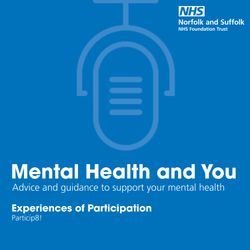
19. Experiences of Participation
28:28||Season 5, Ep. 19Today the group share why they got involved in participation, what their experiences have been like and how you can get involved with Particip8! and participation.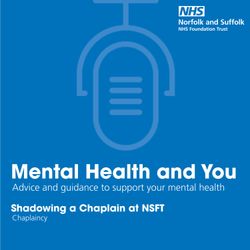
18. Shadowing a Chaplain at NSFT
09:50||Season 5, Ep. 18Today we're joined by Julie our Chaplain and Helen who has been shadowing Julie over the last year. Helen shares a bit about what's stood out to her, why her faith is important to her and more.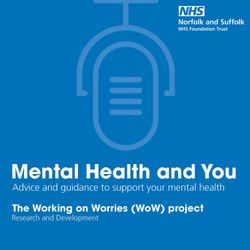
17. The Working on Worries (WoW) project
37:20||Season 5, Ep. 17This episode features a discussion about an innovative project in Norfolk and Waveney involving the local mental health system providing training and support to primary school staff to empower them to offer an early evidence-based intervention for children experiencing problems with anxiety. The project received funding from Norfolk and Waveney Integrated Care Board (ICB) and the National Institute for Health and Care Research (NIHR)’s Mental Health Implementation Network.
16. Neurodiversity in Women
41:16||Season 5, Ep. 16This week we're joined by women from across NSFT who share their lived experience and professional expertise of neurodiversity in women, sharing experiences of ADHD (Attention deficit hyperactivity disorder) and Autism.
15. The Recovery College: Autumn and Winter Timetable
20:27||Season 5, Ep. 15Today we're joined by Danny from the Recovery College who shares some more information about our new Autumn and Winter timetable. If you're interested in learning more about the Recovery College, please visit Recovery College | Norfolk and Suffolk NHS (nsft.nhs.uk)
14. Transitions and change for young people leaving school
57:44||Season 5, Ep. 14Today we're joined by Beth, Clinical Psychologist and service users, Grace and Simone, who discuss their experiences of leaving school and change in young people's lives. The group expand on experiences after school and share how changes after effected them during their life.